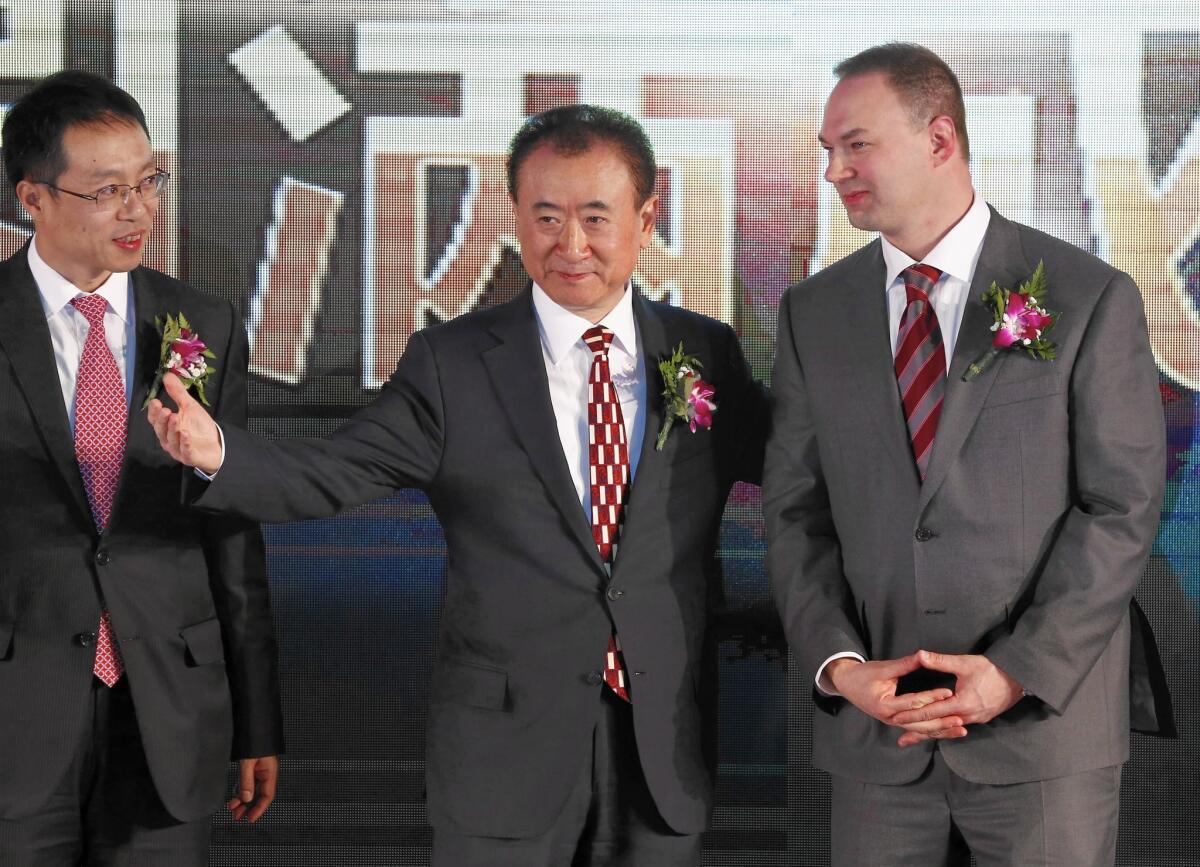Wang Jianlin boosts his influence in Hollywood with Legendary deal

Wang Jianlin, center, chairman of China’s Wanda Group, with Thomas Tull, right, CEO of U.S. film company Legendary, after Wanda Group’s $3.5-billion acquisition.
- Share via
Reporting from BEIJING — Wang Jianlin has long been one of China’s most powerful businessmen, a former military man who made his fortune in real estate.
Now he is poised to become one of the most influential players in Hollywood.
The chairman of Dalian Wanda Group on Tuesday announced a deal to acquire Legendary Entertainment, one of the production companies behind “The Dark Knight,” “Jurassic World” and “Godzilla” movies.
The $3.5-billion acquisition represents the largest by a Chinese firm of a U.S. production company. What’s more, the deal gives 61-year-old Wang, the richest man in China, a new level of influence over Hollywood’s cultural landscape and his country’s ability to project “soft power” around the world.
See more of Entertainment’s top stories on Facebook >>
“We have to have a position in the global industry,” Wang said at a news conference here to formally announce the Legendary purchase, which was first reported last week. “And a few American movie companies have these commanding heights of the movie industry in the world. We want to change this situation and the landscape.”
He’s been working hard in recent years to do that, scooping up a trove of other media and entertainment businesses. In 2015, Wanda acquired a 20% stake in Spanish soccer club Atletico Madrid for $52 million, bought Swiss sports marketing company Infront Sports & Media for $1.2 billion and purchased World Triathlon Corp. of Tampa, Fla., for $900 million.
Wang has also steadily built his presence in Los Angeles. In 2014, his company bought the site of the former Robinsons-May department store in Beverly Hills for $420 million, and has plans for a mixed-use development there. He’s also donated $20 million to the Academy of Motion Picture Arts & Sciences for its new film museum.
“He is building credibility so that when he expresses interest, you know it is going somewhere, it is not just talk,” said USC political science professor Stanley Rosen, a Chinese film expert.
[Wang Jianlin] is building credibility so that when he expresses interest, you know it is going somewhere, it is not just talk.
— Stanley Rosen, political science professor at USC
Wang is known for a buttoned-down sensibility and pragmatic approach to business. Unlike rival Jack Ma — the charismatic, English-speaking head of China’s e-commerce giant Alibaba Group who in 2014 sat courtside at a Lakers game with super agent Ari Emanuel — Wang sticks to his native tongue in public settings.
He’s also an admirer of Bill Gates and Steve Jobs, favors crisp suits over Hollywood’s more casual dress code, and lectured at Harvard Business School in October.
Although he eschews the flashy lifestyle of many billionaire Chinese businessmen, Wang still enjoys the trappings of his success. Married to Lin Ning, Wang collects art, bought an 80-foot yacht and has a playboy son who made headlines recently for racking up a $30,000 tab at a Beijing nightclub.
Wang, a 17-year army veteran from Cangxi County in China’s Sichuan Province, got his start as a real estate developer and has amassed a fortune of $30 billion, according to Forbes. He is known to have ties to the Chinese government and speaks forcefully about the importance of promoting the culture of the world’s most populous country.
Until the Legendary deal, Wang was best known in Hollywood for his 2012 purchase of exhibitor AMC Entertainment for $2.6 billion, making his company the largest cinema operator in the world.
The AMC acquisition raised Wang’s profile in Hollywood, but the Legendary deal is seen as potentially more significant. Burbank-based Legendary is a major producer and maintains a marketing and distribution deal with one of the industry’s biggest studios — Universal Pictures.
“It really cements his reputation as someone who is following through, putting down money,” said Rob Cain, a producer and veteran studio consultant on China. “I don’t know if there is anyone else out there anywhere — even in the U.S. — who is kind of like an old school mogul and making some big bets and putting his money where his mouth is.”
Thomas Tull, who founded Legendary in 2005, will continue to run it.
“He is not just a Chinese visionary but a global visionary,” Tull said of Wang during a conference call Tuesday.
After the news conference announcing the deal, more than 800 people left comments on state-run CCTV’s Web report on the sale. For many of them, it was further proof of Wang’s vast wealth. “Only Wang has the money,” said one, while another wrote, “Wanda is getting richer and richer.”
Still, others expressed pride. “From now on, Hollywood will only shoot the films Wang wants to watch,” predicted one commenter.
At Tuesday’s media event, Wang noted that Hollywood studios already incorporate Chinese elements into their productions.
“I think this is very normal because U.S. companies want to grab a share in the Chinese high-growth market,” he said. “They should do something to cater to Chinese audiences’ interests — if they don’t, there might be trouble.”
Wang is leading a new breed of Chinese investor. Until now, many trans-Pacific deals have been narrow, focusing on the co-production of films that can be shown in China. Wang, however, has a more ambitious goal of using Hollywood expertise to make movies that can do well worldwide.
“We already have a big impact in China, however this is not enough — we have to have a global vision,” Wang said Tuesday.
By acquiring Legendary, Wanda has created a vertically integrated film enterprise, said Marc Ganis, co-founder and managing director of Jiaflix Enterprises, which helps studios distribute movies in China.
We already have a big impact in China, however this is not enough -- we have to have a global vision.
— Wang Jianlin, chairman of Dalian Wanda Group
“Were this in the United States, it would be considered a violation of antitrust laws — but there are no antitrust laws in China,” Ganis said. “It allows a company like Wanda and a visionary like Wang to continue to grow in ways that are symbiotic.”
A major part of Wang’s showbiz plans center on an $8-billion real estate development planned for Qingdao, China. It would include 30 film and TV sound stages, postproduction facilities and a replica of a New York City street. The project, called Wanda Studios Qingdao, was revealed at a splashy event in 2013 that was attended by studio executives, talent agents and actors such as Leonardo DiCaprio and Nicole Kidman.
Legendary could give credibility to the Qingdao project, said Noble Coker, who until last year was an executive in Wanda’s theme park division.
“The hard part is figuring out how to make this work,” said Coker, a business strategy lecturer at USC’s Marshall School of Business. “If you look at the new acquisition in this context, it fits in very well with ‘we’re going to have to learn this, we need to understand it so we can make sure that the investment in Qingdao works at the end of the day.’”
It’s all part of an effort that aims to capitalize on China soon becoming the biggest film market in the world. By 2017, the box-office take of China is expected to surpass that of North America.
Additionally, the Legendary deal could help Wanda’s potential effort to take its show business enterprises public. Wang said Tuesday that he was considering an initial public stock offering for the new entity.
The blockbuster acquisition could spur other deals between Chinese and Hollywood companies. Over the last year or so, more notable transactions have been consummated than has historically been the case, said entertainment attorney Lindsay Conner, citing the 2015 pacts between STX Entertainment and Huayi Brothers Media Corp., and Lionsgate and Hunan TV.
“The reasons for wanting to do deals between Hollywood and China are growing more compelling as time goes by,” said Conner, co-chair of the entertainment and media practice at Manatt Phelps & Phillips. “I think we will see more of this.”
Miller reported from Los Angeles and Makinen from Beijing.
Nicole Liu, Alex Li and Jonathan Kaiman in The Times’ Beijing bureau contributed to this report.
More to Read
Sign up for The Envelope
Get exclusive awards season news, in-depth interviews and columnist Glenn Whipp’s must-read analysis straight to your inbox.
You may occasionally receive promotional content from the Los Angeles Times.












